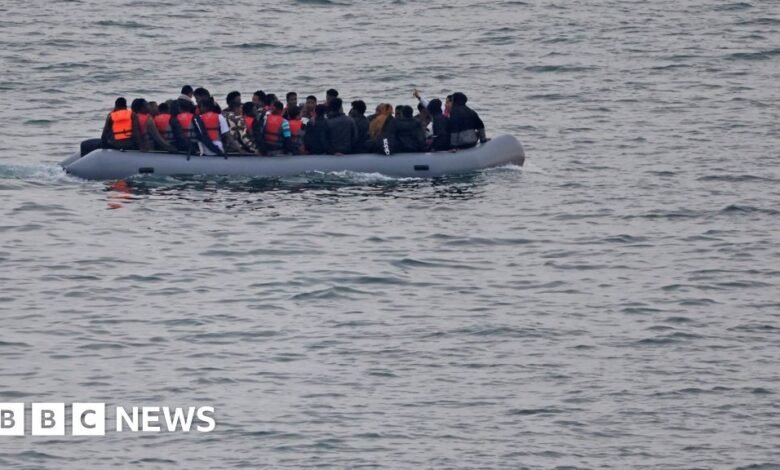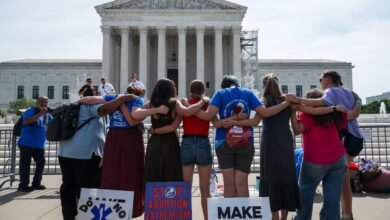Chris Mason: Sunak, Starmer and their little boats row

- By Chris Mason
- Political Editor
There is a single word at the heart of the political row between the Prime Minister and Labor leader Sir Keir Starmer when it comes to unauthorized immigration.
The issue of people in small boats crossing the English Channel is so hotly contested that even the terminology of the topic is contested.
There are asylum seekers who have applied for refugee status and are awaiting a decision. There are refugees. There is illegal immigration. Overlapping descriptions and labels, many of which provoke fury and anger.
And so to that word – amnesty. Both Rishi Sunak and Sir Keir are trying to weaponize it, to make what they see as a negative point about their opponent.
The Labor leader accused Sunak of a “Travelodge amnesty” – people who arrived in small boats and are, in UK law, illegal immigrants. They are stuck in limbo in UK hotels, at significant cost to the taxpayer.
In fact, Sir Keir did this while projecting a confidence in him that I had never seen before.
Not just his on-stage attitude, but his willingness to praise a conservative idea – Small Boat Operational Command – strictly to a certain extent, which he claims he would build on. And praise a Conservative minister, Justice Secretary Alex Chalk.
Overall, I thought, he was equivalent to a man with the air of an heir.
A man – after local election results and the Tories’ second defection to his party in two weeks – who may feel closer than ever to the prospect of becoming prime minister.
Sir Keir’s label of an alleged Tory “Travelodge amnesty” is an attempt to dismiss the Conservative description of Labor’s plan to allow people who arrived in small boats to claim asylum.
Yes, you guessed it, conservatives also describe this as an amnesty.
Both leaders clearly see political value in projecting aggression on this issue and portraying their opponent as weak, even soft.
The general picture here, recognized by both and illustrated in this example, is that this is deeply complex and there is no ready-made panacea.
What do you do with the huge backlog of people? How do you create impediments to crossing the English Channel? Are impediments even possible?
What does fairness and justice look like for people contemplating a crossing, for others seeking a legal route to the UK, and for the British taxpayer? Are international legal frameworks, national laws or agreements with other countries up to the challenge?
It is essential to return more people who have not been granted asylum to their country of origin.
BBC Verify has been looking at how this might apply to recent small boat arrivals.
Vietnamese – 1,266 in total – and Afghans – 1,216 people – make up the two main nationalities to have arrived in the UK in this way so far this year.
The next most common nationalities arriving in this way between January 1 and April 21, 2024 were Iranians, Syrians and Eritreans.
Of these five countries, the government only has a return agreement with Vietnam, so ministers from this government or any future government would have to negotiate agreements with the other four if asylum seekers’ applications were rejected.
Furthermore, none of them are currently on the government’s list of places from which people can be safely repatriated, posing an additional potential challenge.
It is up to Sunak, Sir Keir and others to win arguments and gain trust on these most difficult emotional, diplomatic and political issues – and to fight for solutions. However partial, verbose and expensive they may be.




